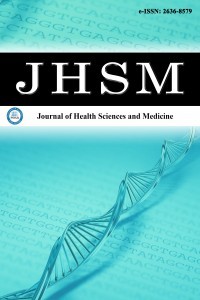
Journal of Health Sciences and Medicine
Yazarlar: Ahmet SARICI, Nurcan KIRICI BERBER, Ozlem ÇAĞAŞAR, Soykan BİÇİM, Furkan ÇAĞAN, Özkan ULUTAŞ, Harika GÖZÜKARA, Yusuf YAKUPOĞULLARI, İlhami BERBER
Konular:Sağlık Bilimleri ve Hizmetleri
DOI:10.32322/jhsm.839303
Anahtar Kelimeler:Covid-19,Charlson Comorbidity Index,Mortality,Prognosis,Laboratory features
Özet: Objective: Demographic and laboratory values predicting clinical severity in Covid-19 patients have been a matter of curiosity since the beginning of the disease. We aimed to show the relationship between the severity of Covid-19 disease and comorbidities, clinical and laboratory features of the patients. Material and Methods: The data of Covid-19 patients diagnosed with polymerase chain reaction (PCR), were analyzed retrospectively. The patients were divided into 3 groups according to their clinical severity as mild, moderate and severe. Comorbidities and the Charlson Comorbidity Index (CCI) at the time of diagnosis were calculated for each patient from the patients' records. Demographic data, laboratory values, comorbidity and CCI scores were compared between the patient groups. The effect of CCI on survival and length of hospital stay was examined. Results: One hundred and four patients were included in the trial. The most common comorbid disease in the patients included in the trial was hypertension. The moderate-severe stage patients were statistically significantly older (p<0,001). The CCI was found to be statistically significantly different between mild, moderate and severe groups (p<0,001). When CCI increases by one unit, the risk of death increases by 1.193 times (p=0.017). Older age, WBC, neutrophil count, BUN, creatinine, AST, potassium level, CRP, procalcitonin, aPTT, fibrinogen, d-dimer, and ferritin levels were found to be higher in the clinically severe patient group. Lymphocyte and eosinophil counts, total protein, albumin and sodium levels were found to be lower in the clinically severe patient group. Conclusion: This trial showed that calculating the CCI score in Covid-19 patients can be useful in predicting the severity of the disease. Examination of CCI, age, WBC, neutrophil, lymphocyte, eosinophil counts, BUN, creatinine, AST, total protein, albumin, sodium, potassium level, CRP, procalcitonin, aPTT, fibrinogen, d-dimer and ferritin levels at the time of diagnosis can be suggested.